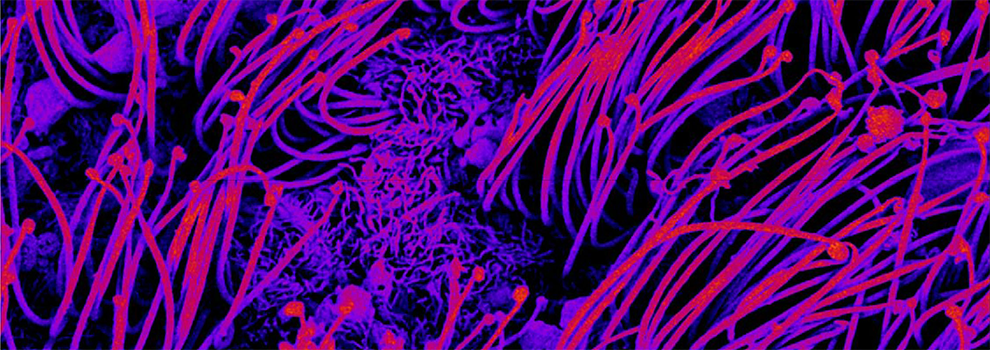Lithium treatment rescues fear memory deficit in mouse model of intellectual disability

Image Credit: Calvin S. Carter (CC-BY 4.0)
Cilia—tiny hair-like organelles—control fear memory
Using a mouse model of a human disease that causes intellectual disability, researchers at the University of Iowa Carver College of Medicine found that lithium therapy may have potential for treating learning and memory problems. The study was published April 22 in the journal PLOS Genetics.
The researchers studied a mouse model of Bardet-Biedl Syndrome (BBS), a genetic disease that causes a constellation of problems including intellectual disability, vision loss and obesity, and sometimes kidney problems and extra fingers and toes. The genetic mutations in BBS damage cilia – tiny hair-like structures on the surface of cell.
“Every cell in the brain possesses cilia, but what the functions of these antennae-like structures are in facilitating memory and human cognition remains a mystery,” says Calvin Carter, PhD, a post-doctoral research fellow and co-lead author of the study.
The new findings demonstrate a novel role for cilia in learning and memory in the brain, potentially improving our understanding of the mechanisms that cause intellectual disability, which is the most common type of neurodevelopmental disorder, but has few drugs available to treat it.
“Our BBS mouse is a great model to study the role of the cilia on behavior,” adds Thomas Pak, a student in the UI Medical Scientist Training Program and co-lead author of the study. “One behavior that was strongly affected by the disease was fear memory. Compared to normal mice, BBS mice are not as able to generate a fear memory associating a fearful event with a specific environment.”
Further investigation showed that this impaired ability to generate long-term fear memory was linked to a reduced capacity to make new neurons in the hippocampus, an area of the brain involved in learning and memory. Treating the BBS mice with lithium improved their long-term fear memory and also enhanced the generation of new neurons in the hippocampus.
“The finding that we can actually rescue the fear conditioning impairment with lithium is really interesting,” Pak says. “Lithium has been used for decades and is one of the most effective psychiatric medications available.”
Work from other research groups has suggested that lithium may also have potential to improve learning and memory problems in Alzheimer’s disease, Down syndrome, and Fragile X disease. The new UI findings add more evidence supporting further studies to test the use of this FDA-approved drug for human diseases that disrupt memory and learning.
Together with Pak and Carter, the study was led by senior author Val Sheffield, MD, PhD, professor in the Stead Family Department of Pediatrics, Division of Medical Genetics and Genomics, and the Department of Ophthalmology and Visual Sciences at the UI Carver College of Medicine. The multidisciplinary team also included colleagues from the UI Departments of Psychiatry, Pediatrics, Orthopedics, Obstetrics and Gynecology, Molecular Physiology and Biophysics, Biostatistics, and the Iowa Neuroscience Institute, as well as from Case Western Reserve University. The co-authors are Sunny Huang; Charles Searby; Ying Hsu, PhD; Rebecca Taugher, PhD; Tim Vogel, MD; Christopher Cychosz, MD; Rachel Genova, MD, PhD; Nina Moreira, MD; Hanna Stevens, MD, PhD; John Wemmie, MD, PhD; Andrew Pieper, MD, PhD, and Kai Wang, PhD.
The study was funded in part by grants from the American Diabetes Association, the National Eye Institute, part of the National Institutes of Health (NIH), and the Roy J. Carver Charitable Trust. The work was also supported by core facilities funded by the NIH. Andrew Pieper also received support from the Brockman Foundation, the Louis Stokes VA Medical Center resources and facilities, the American Heart Association-Allen Initiative in Brain Health and Cognitive Impairment, and the National Institute on Aging.
